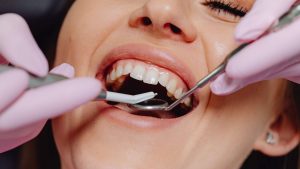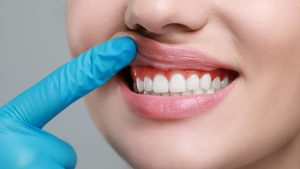General Soreness
After your braces are adhered to your teeth, you may experience some soreness associated with them, such as tenderness during biting pressure. Your orthodontist will recommend eating a soft diet for several days following the appointment. If you’re following this diet and still feel general soreness in your teeth or gums, it can be relieved by rinsing your mouth with a warm saltwater solution. Dissolve one teaspoon of salt in eight ounces of warm water and rinse your mouth vigorously. You can also take over the counter medications such as Tylenol. It is not recommended to take NSAIDs like ibuprofen, as these medications actually slow down the movement of your teeth, which of course interferes with your orthodontic treatment. If you find that your lips, cheeks, or tongue become irritated as they adjust to your new braces; you can put dental wax on the braces to lessen irritation.Headgear
If you have been prescribed headgear by your orthodontist, you must wear it exactly as instructed. Discomfort can be caused by not wearing your headgear regularly. Typically, the headgear hurts less the more it is worn. Also, if you find that something is damaged or bent on your equipment, you will need to contact your orthodontist for it to be repaired.Loose Appliance
If part of your braces or headgear is loose and poking you, place wax on the offending part until you can see your orthodontist.Loose Bracket
If your bracket or band is still attached to the wire, you should leave it in place and put wax on it if you need some comfort. If the bracket or band can be removed easily, place it in an envelope and save it to bring to your next orthodontist appointment.Loose Wire
Using a pair of tweezers or needle-nosed pliers, try to put your wire back into place. It is okay to use a piece of floss to tie the wire into place. To do this, tie the floss around the bracket in place of the missing colored o-ring. If you cannot put the wire into a comfortable position, and covering the end with wax doesn’t help, as a last resort use a small fingernail clipper to clip the wire behind the last tooth to which it is securely fastened. If the end of the wire is still sharp, place wax on it.Poking Wire
Using a pencil eraser, push the poking wire down or place wax on it so that it is no longer poking you. If you are hesitant to perform any of these quick fixes at home, there’s nothing wrong with just leaving it alone and coming in for an appointment. We’re here to make your orthodontic experience as comfortable as possible.It is important to be prepared for when a minor or major orthodontic emergency occurs. If you find yourself in a situation where you are unsure if you need urgent medical attention, you will need to first assess the severity of the problem. Dislodged, fractured, or knocked-out teeth usually require urgent attention. With minor emergencies, the problem is usually just an irritant and can be tended to at home until you can schedule an appointment with your orthodontist.
Minor Emergencies
The following are common minor orthodontic emergencies that can be treated at home until you can see your orthodontist:
Loose or Broken Brackets, Bands, or Wires
You can experience discomfort with your braces if you do not follow your orthodontist’s instructions. Eating foods that can easily damage or alter braces can result in loose brackets, bands, or wires, which can ultimately lead to breakage. This type of malfunction can result in your hardware poking the inside of your mouth, causing painful irritation or other types of injuries. Placing orthodontic wax over the hardware problem will temporarily relieve your discomfort until you can see your orthodontist.
Wire, Tie, or Bracket Shifts from its Proper Position
As you talk and eat food normally throughout the day, your braces will slightly adjust on their own. However, if an archwire or other hardware component significantly deviates from its proper position, it can poke the inside of your mouth and cause discomfort. You can use tweezers to adjust the hardware temporarily, so that you can eat and speak normally until you are able to see your orthodontist.
Severe Tooth Pain or Loosening
Some discomfort is normal when it comes to the shifting or loosening of your teeth as your braces do their job. Over-the-counter pain relievers and anti-inflammatory medications can help decrease the pain. However, it’s important to recognize when your discomfort far exceeds what is normal. High impact, such as by a sports or vehicle accident, against your braces and teeth can cause severe pain. You will need to see your orthodontist as soon as you can so they can re-strengthen your teeth and maintain your treatment timeline.
Broken Retainers
Retainers are important for the longevity of your post-treatment routine and they are very fragile. If it ever breaks or bends in a strange way, visit your orthodontist for a repair or replacement.
Swallowing Part of Your Equipment
Though this is a less likely occurrence, swallowing an appliance can still happen. If your retainer has broken into small pieces in your mouth, it’s possible to accidentally swallow it when you’re sleeping or not paying attention. In most cases, the bit of your retainer will pass through your digestive system without harm. However, if you are choking or finding it hard to breathe, you will need to go to the emergency room immediately.
Major Emergencies
If you have sustained a high-impact blow to the mouth and are experiencing severe bleeding and pain, you will need to go to the hospital immediately. The emergency room may not have the expertise or equipment you need to repair your braces; however, you should still go if you’ve also sustained trauma to your neck or head. After you’re cleared to leave the emergency room, visit your orthodontist as soon as possible to repair or replace any damage done to your braces.


